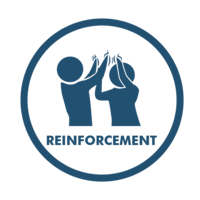This is the 9th of a 12 part series on Evidence Based Principles. Subscribe to our blog and get this series and the upcoming Risk Principle Simplified series delivered right to your inbox.
Key Takeaways
- Positive reinforcement is one of the most effective tools for shaping long-term prosocial behavior in community corrections.
- Research shows that reinforcement should significantly outweigh punishment to drive real behavior change.
- When tracked and applied consistently, positive reinforcement improves engagement, compliance, and staff-client relationships.
Positive reinforcement is not about being lenient or ignoring accountability. It is about intentionally recognizing prosocial behavior, actions that reflect responsibility, effort, and progress, and using that recognition to reinforce change. When applied correctly, positive reinforcement strengthens motivation, builds trust, and encourages long-term behavioral growth.
At CorrectTech, positive reinforcement is treated as a foundational component of evidence-based community corrections. Through structured behavior management tools and data-driven insights, CorrectTech helps agencies track, measure, and apply reinforcement consistently, ensuring that “catching people doing right” becomes part of daily supervision, not an afterthought.
Principle 5b: Increase Positive Reinforcement
Think about the last dog you trained. Opting for praise and treats was not a challenge. Everyone knows that positive reinforcement should outweigh punishment when attempting to train a new behavior. Somehow, it seems we forget this lesson when it comes to people.
Perhaps we expect more out of people than dogs. Maybe it is the years of “tough on crime” mentality. Is it possible that we are hard wired to think of punishment before praise? While diligence is required, it is certainly possible to transform an environment focused on punishment to one centered on “catching them being good.”
What Is Positive Reinforcement in Community Corrections?
Positive reinforcement occurs when a desired behavior is followed by a rewarding or affirming response, increasing the likelihood that the behavior will be repeated. In community corrections, this can include:
- Verbal recognition from officers
- Reduced supervision requirements
- Earned incentives or privileges
- Progress acknowledgments tied to treatment milestones
Prosocial behavior refers to actions that benefit both the individual and the community, such as attending treatment consistently, maintaining employment, following supervision conditions, or engaging respectfully with officers and service providers.
When supervision focuses only on violations, clients learn what not to do but not necessarily what to do instead. Positive reinforcement fills that gap by reinforcing the behaviors agencies want to see more often.
Why Punishment Alone Falls Short
Punishment may stop a behavior temporarily, but it rarely teaches replacement behaviors. In many cases, excessive reliance on sanctions can:
- Damage trust between staff and clients
- Reduce motivation and engagement
- Increase resistance and defiance
- Create compliance driven by fear rather than internal change
Research in behavioral science shows that punishment works best when paired with significantly more reinforcement. Without that balance, individuals often comply only until external pressure is removed, leading to higher rates of relapse or recidivism.
Community corrections professionals are not just enforcing rules; they are influencing long-term behavior. Positive reinforcement helps bridge the gap between supervision and sustainable change.
The Evidence Behind Positive Reinforcement
Decades of evidence-based research on practice support the use of positive reinforcement in corrections. Studies consistently demonstrate that individuals respond more favorably when prosocial behaviors are acknowledged multiple times, compared to when problem behaviors are corrected.
Best-practice models often recommend a 4:1 or greater ratio of positive reinforcement to corrective feedback. This doesn’t mean ignoring violations. It means ensuring that positive behavior receives proportionally more attention.
When reinforcement is consistent and meaningful, clients are more likely to:
- Stay engaged in treatment
- Follow supervision requirements
- Develop internal motivation
- Build confidence in their ability to succeed
Prosocial Reinforcement and Staff-Client Relationships
One of the most overlooked benefits of positive reinforcement is its impact on relationships. Community corrections is a relationship-driven field. When staff consistently acknowledge effort and progress, they strengthen rapport and credibility.
Clients who feel recognized are more likely to:
- Communicate honestly
- Accept feedback
- View supervision as supportive rather than adversarial
For staff, positive reinforcement also improves job satisfaction. Officers who see tangible progress and have tools to document it experience greater purpose and reduced burnout.
CorrectTech supports this relational approach by giving officers structured ways to document positive interactions, track reinforcement patterns, and maintain consistency across teams.
Making Positive Reinforcement Consistent (Not Random)
One of the biggest challenges agencies face is inconsistency. Reinforcement that is sporadic or subjective loses its effectiveness. To work, positive reinforcement must be:
- Timely
- Specific
- Consistent
This is where structured systems matter. Relying on memory or informal notes often results in uneven application. Some clients receive encouragement; others don’t, not because of behavioral differences, but due to time constraints or oversight.
CorrectTech’s behavior management tools help agencies move from informal praise to documented, measurable reinforcements, allowing leadership to monitor patterns and ensure equity across cases and officers.
Positive Reinforcement as an Evidence-Based Practice (EBP)
Positive reinforcement is not a standalone tactic. It is a core component of evidence-based practice. When agencies integrate reinforcement into case planning, treatment coordination, and supervision strategies, they strengthen overall program fidelity.
EBP-aligned reinforcement supports:
- Risk-need-responsivity (RNR) principles
- Individualized supervision strategies
- Data-driven decision making
- Continuous quality improvement
By tracking reinforcement alongside outcomes, agencies can identify which strategies are most effective and adjust policies and training accordingly.
Using Data to Improve Reinforcement Strategies
Effective reinforcement doesn’t stop at delivery. It must be measured. Data allows agencies to answer critical questions:
- Are officers reinforcing behavior consistently?
- Are certain clients receiving more reinforcement than others?
- Does increased reinforcement correlate with better outcomes?
CorrectTech helps agencies turn reinforcement into actionable data. By analyzing patterns, supervisors can coach staff, refine strategies, and ensure reinforcement aligns with organizational goals.
This closes the loop between behavior, feedback, and improvement, a hallmark of high-performing community corrections agencies.
Reinforcing the Behaviors That Lead to Change
Positive reinforcement is not an optional strategy. It is a proven driver of lasting behavioral change in community corrections. When agencies intentionally recognize prosocial behavior, they help individuals internalize success, build confidence, and move toward long-term stability.
CorrectTech champions this approach by making positive reinforcement measurable, consistent, and actionable. By equipping staff with tools that support evidence-based reinforcement, agencies can move beyond reactive supervision and toward a culture of progress, accountability, and growth.
When people are recognized for doing the right thing, they’re far more likely to keep doing it. And in community corrections, that makes all the difference.
In our next blog in this series, we will address Principle 6, Engage Ongoing Support in Natural Communities. Subscribe to our blog and get this series and the upcoming Risk Principle Simplified series delivered right to your inbox.
This a 12 part series. Here are all 12 blogs in the series:
- An Introduction to Evidence Based Principles (EBP)
- EBP: Building the Therapeutic Relationship
- Community Corrections Interventions Must Begin with Assessment
- To Be or Not to Be: Framing Offender Motivation
- EBP: How Good is Your Aim?
- Discovering Values in Collaboration
- Practice Makes...Habit
- Structure & Accountability Still Matter!
- Catch Them Being Good!
- It Takes a Community to Transition an Offender
- What Works Anyway? Prove it!
- Feedback Please!



